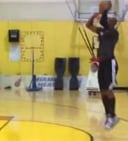Featured Player: Ray Allen - Miami Heat
 Ray Allen meets Noah for first time
Ray Allen meets Noah for first time
By Tom Haberstroh - ESPN.com
MIAMI -- You could say it was love at first sight.
Following the Heat's practice on Saturday, Heat assistant coach Keith Askins introduced Ray Allen to a talking black box on the wall named "Noah."
Noah is a shooter's best friend. The technology tracks a player's shooting arc as the player goes through drills and logs it into its computer for post-workout analysis. Not only that, the machine provides instant verbal feedback, shouting out the exact degree angle at which the shot is projected off the player's hand.
After consulting the instructional poster on the wall next to Noah (get it, Noah's arc?), Allen went to work, firing off an 18-foot jumper.
"Forty," Noah said.
Allen shot another.
"Forty-two."
And another.
"Thirty-seven."
This went on for several minutes as Askins explained the virtues of Noah to Allen as he passed him the ball.
You see, Allen is a shooting perfectionist. Shot after shot, Allen constantly tinkered with his shot arc depending on what Noah told him. (Yes, that's Noah reciting the numbers in between Allen's shots in the above video.)
"That machine’s going to keep me around for 10 more years," Allen said. "I didn’t know it was here. I’ll definitely use it every day."
Noah has been hanging on the Heat practice facility's wall for years. In fact, Dwyane Wade used the machine to help correct his free throw shooting last season. Now, Allen is Noah's latest pupil.
But does Allen really need it? I mean, this is a guy who has made more 3-pointers than any player in NBA history.
Apparently, he does need it.
"Over the past 10 years, I’ve been in a fight with my jump shot," Allen said, in all seriousness.
"Just tryin' to figure out how to get bigger arc in my shot, how to get my legs involved, to get better lift on it, to get the ball getting a better angle on it into the air."
Wait, Allen has been at odds with his jumper over the past decade?
"Strange as it seems, yeah."
Impossible.
"When I was in college," Allen began, "I would have a great practice and I’d miss only two or three shots the whole practice. Coach [Jim Calhoun] would always ask me, ‘Did you shoot 100 percent?’ The answer was always no. If you don’t shoot 100 percent, you always have something to strive for."
Remember: perfectionist.
“Me, I’m so particular about it, I want to be perfect," Allen said of his shooting. "Basketball is imperfect, so shootingwise it’s a constant struggle.”
But Noah could be a little over the top, no? Couldn't it cause you to be self-conscious, like too many thoughts going through your head?
"A thought in my head would be if I was coming out of the game and someone told me 'You’re doing this wrong, you’re doing that wrong,'" Allen said. "You don’t want those thoughts."
Allen clearly values Noah's contribution. This makes sense; Allen's been receptive to the analytics movement that has gradually impacted the sport. While casually talking about the value of empirical analysis to surrounding reporters, Allen gave a tip of the hat to Boston Celtics assistant GM Mike Zarren, whom the Celtics teammates called "Numbers."
Zarren would keep Allen and his teammates in Boston up to date on their advanced statistics, including plus-minus and per-possession lineup data. But now, in the case of Allen, the student becomes the teacher. After the Heat's preseason game against New Orleans, Allen taught fellow Heat reserve Norris Cole a lesson on plus-minus.
"I was telling Norris, the best thing that we can do is make sure we have great plus-minus numbers," Allen said. "That means we’re not giving up leads and we’re efficient while we’re on the floor."
While single-game plus-minus may be too fluky to hold any real predictive value, it can be of use over the long haul. To Allen, these numbers help him digest a game that is played at blinding speeds.
"It's just information," Allen said. "For us, going into every game, you want that information. It does force you to do something out there ... For improvement, information is key."
But not all statistics are created equal.
"Sometimes it can be too much," Allen said. "'SportsCenter' often comes up with some random stat or fact. This guy scored this many points every Tuesday of this month in his 10-year career and he’s leading this category and only two players have done that. Sometimes those figures get kind of crazy."
Almost as crazy as the notion that Ray Allen struggled with his shot over the past 10 years.